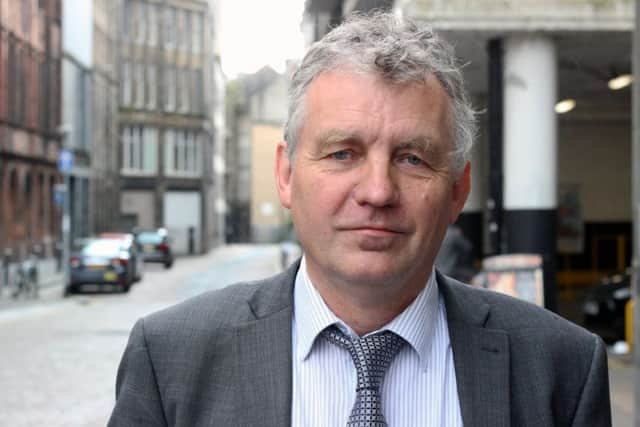Turning a blind eye to 10,000 deaths in Scotland


Consider the toll that would take on the sons, daughters, brothers, sisters, mothers, fathers and grandparents left behind.
It may sound like the plot of a disaster movie but, in reality, it has already happened here in Scotland.
Advertisement
Hide AdAdvertisement
Hide AdAnd many of us will not have even batted an eyelid ... for those 10,000 people who died in the last ten years did not succumb to cancer or meet their untimely end on our country road network.


Their deaths were drug-related. Self-inflicted, then, you may think.
But with 61,500 people now experiencing a drug problem in our country – many of whom have other underlying health issues – it’s an issue we can no longer afford to ignore.
The National Records of Scotland recently revealed there were 934 drug-related deaths in Scotland in 2017.
Advertisement
Hide AdAdvertisement
Hide AdDavid Liddell, the chief executive officer of the Scottish Drugs Forum, said: “Just over 10,000 people have now died since these figures were first issued in 1996.
“Last year was a record high – and so was the year before, and the year before that. In the last 10 years the annual figures have more than doubled.
“In 2017, almost 1000 people died resulting in possibly around 10,000 people losing someone close to them ... in just one year.
“That is an immeasurable loss which lasts a lifetime for those left behind.
Advertisement
Hide AdAdvertisement
Hide Ad“Scots are five times more likely to die from drugs than in a road traffic accident.
“Yet these deaths are entirely preventable.
“We know how to prevent them and yet we don’t do all that we could to do so.
“For the cost of providing a dual carriageway on a few hundred metres of the A9, we could substantially prevent these deaths among some of the most vulnerable people in Scotland and prevent families suffering this loss.
“That means making sure there is accessible, high quality healthcare and support – like the rest of us are afforded when we are ill.”
Advertisement
Hide AdAdvertisement
Hide AdThe Scottish Government is expected to announce a new drugs strategy before the end of the year.
It is hoped this will help reduce drug deaths here, which are the highest rate of anywhere else in the EU.
Joe FitzPatrick, Public Health Minister, said: “Each of these untimely deaths is a tragedy and I offer my deepest condolences to the families and friends who have lost loved ones over the last year.
“We will continue to do all we can to prevent others from experiencing similar heartbreak.
Advertisement
Hide AdAdvertisement
Hide Ad“We are developing a refreshed substance use strategy in direct response to the changing drugs landscape, the continued rise in drug-related deaths and the recognition that current services do not meet the needs of all the people who need support.
“The new strategy will take a person-centred approach so that treatment and support services address people’s wider health and social needs, such as mental health, employability and homelessness.”
The Scottish Drugs Forum is advocating for far quicker, more flexible access to joined-up services and retaining, rather than dismissing, patients.
It’s a method which has already shown dramatic results in Norway.
Advertisement
Hide AdAdvertisement
Hide AdDavid explained: “The evidence is very strong that if people are in treatment and on opioid replacement therapy it protects them against fatal overdose death.
“We need to look at how people access services and how to gain swifter access.
“At the moment, the government target for access to services is three weeks but it can take much longer.
“For an individual presenting in crisis, having to wait up to three months is a lifetime for them.
Advertisement
Hide AdAdvertisement
Hide Ad“If we can ensure access is swifter, the focus then moves to trying to do more to retain people, particularly the most vulnerable group who are going in and out of services on a regular basis.
“NHS services can be quite rigid in terms of appointment times and treatment programmes.
“Norway is starting to reduce fatal overdose deaths by improving access to services and not declining people who do not comply with treatment regimes.”
David also believes the wider Scottish community has a role to play.
Advertisement
Hide AdAdvertisement
Hide AdHe explained: “As a society, we seem immune to these figures which come out every year. Why are we not paying more attention?
“The people we are talking about are mostly from poor, underprivileged backgrounds and I think that’s one of the factors.
“It’s a sad indictment of our society today that more compassion is not shown.
“Many people have had drug problems for a long time and there are often underlying reasons for that, such as childhood trauma or mental health issues.
Advertisement
Hide AdAdvertisement
Hide Ad“But it’s perceived that drug problems are self-inflicted and, therefore, these people are somehow not deserving of help and support, which makes matters considerably worse. For these attitudes only serve to reinforce the view that no-one cares about them and adds to the stigma people already feel.
“It’s a really sad message to send out and can result in people giving up hope.
“But there is hope. Many people do emerge from their drug problems. We just need to keep them alive until they have time to recover.”
As for the future, David also remains hopeful.
He added: “Imagine that we had a strategy to prevent drug deaths as we currently do for deaths by suicide.
“Imagine that we could save more than 10,000 Scots from suffering a bereavement next year.
“We imagine that Scotland is possible.”